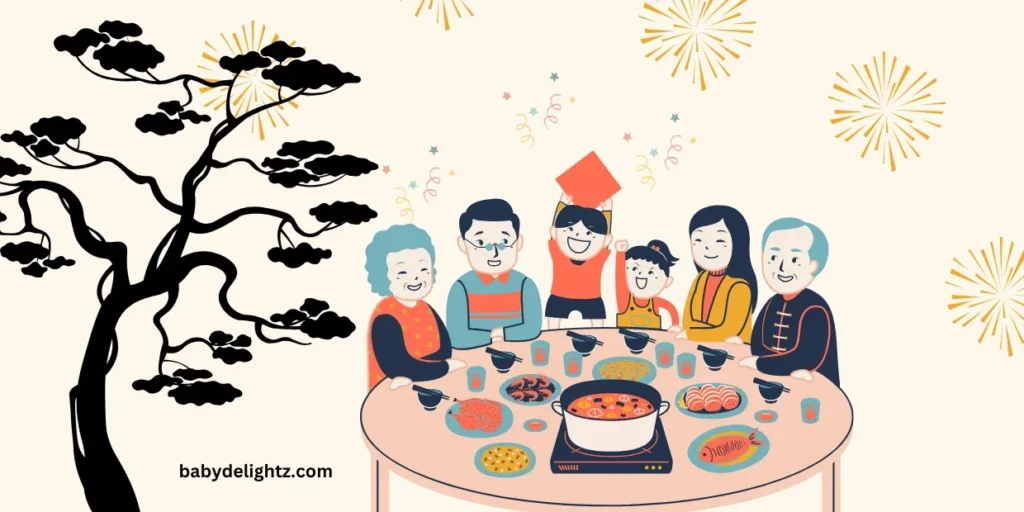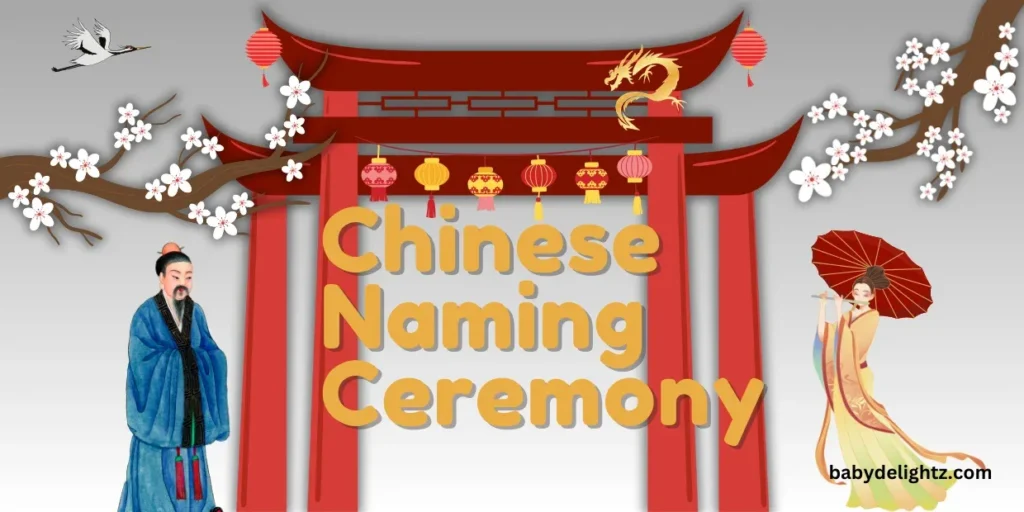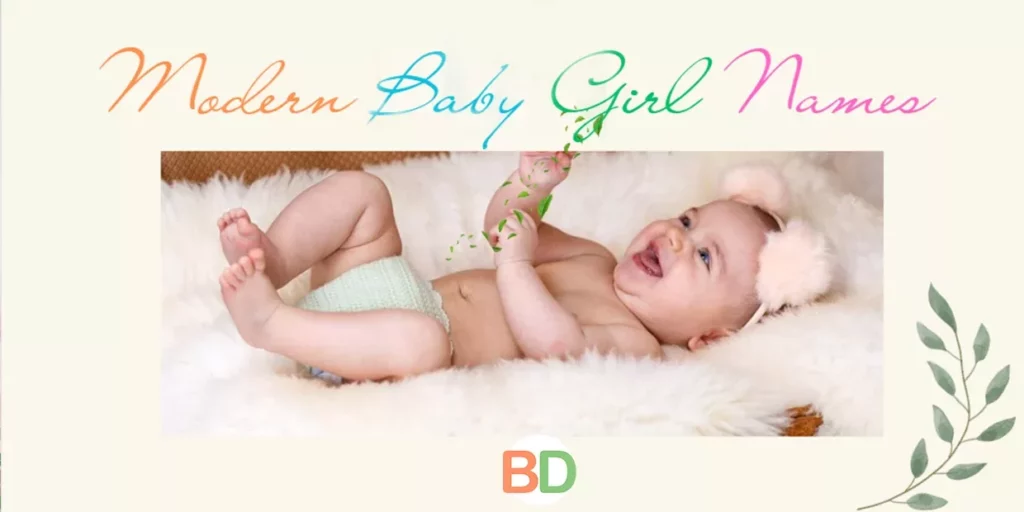Traditions weave a bright and intricate pattern through Chinese culture, shaping life’s significant events. Among these cherished rituals is the Chinese Naming Ceremony, also known as “Bai Jia Bei” or “Bai Cai“, is a celebration that marks the introduction of a newborn into the family and community with profound cultural significance.
This timeless tradition, rooted in ancient customs and beliefs, continues to resonate deeply in contemporary Chinese society, reflecting the enduring values of family, respect, and harmony.
Origins and Symbols
The origins of the Chinese Naming Ceremony can be traced back thousands of years to ancient China, where naming rituals held profound spiritual and social significance. Names were not mere labels but imbued with deep meanings, believed to influence an individual’s destiny and character. The choice of a name was thus a weighty responsibility guided by cultural beliefs and auspicious symbols.
In traditional Chinese culture, the concept of balance and harmony, known as yin and yang, permeates every aspect of life. This principle extends to the naming of children, where names are often crafted to reflect the harmonious blending of complementary forces. For instance, a name might combine elements representing strength and gentleness, wisdom and humility, or prosperity and humility.
Chinese Naming Ceremony
The Chinese naming ceremony typically takes place within the first month after a child’s birth, signifying the formal introduction of the newborn to family members, friends, and the wider community. While customs may vary across regions and families, certain elements are integral to this sacred ritual.
Selecting a Name
Central to the ceremony is the selection of a name for the newborn. This process is not arbitrary but guided by cultural beliefs and auspicious meanings associated with different characters and combinations. Parents often consult fortune tellers and elders or reference traditional texts to choose a name that aligns with their hopes and aspirations for their child.
Offerings and Blessings
The Naming Ceremony is accompanied by offerings and blessings, symbolizing wishes for the child’s health, happiness, and prosperity. Traditional offerings may include red eggs, a symbol of fertility and new life, and other symbolic foods signifying good fortune.
Ancestral Homage
Another significant aspect of the ceremony is paying homage to ancestors. It reflects the deeply rooted Confucian values of filial piety and respect for one’s heritage. By honouring past generations, the Chinese naming ceremony connects the child to their familial lineage and instils a sense of continuity and belonging.
Red Thread Tradition
In some regions, the Red Thread Tradition is observed during the Naming Ceremony. A red thread, symbolizing fate and destiny, is tied around the child’s wrist by an elder or respected family member. This gesture is believed to symbolize the bond between the child and their loved ones, as well as protection from negative influences.
Celebratory Feast
The culmination of the Chinese naming ceremony often involves a celebratory feast where family members and guests gather to share blessings, good wishes, and joyous moments. Food plays a central role in Chinese culture, symbolizing abundance, unity, and prosperity.
Evolution and Contemporary Significance
While the essence of the Chinese naming ceremony remains rooted in ancient traditions, its practice has evolved in response to modern lifestyles and cultural influences. In contemporary China and among the global Chinese diaspora, the ceremony continues to hold deep significance, albeit with variations in customs and interpretations.
One notable change is the inclusion of modern elements alongside traditional rituals. For example, some families incorporate elements of Western naming conventions, such as middle names or English names, reflecting cultural fusion and global interconnectedness.
Moreover, the Chinese naming ceremony transcends geographical boundaries, uniting Chinese communities worldwide in celebrating their cultural heritage and familial ties. In multicultural societies, it serves as a bridge between generations, preserving cultural identity while embracing diversity.
Cultural Significance and Symbolism

Naming Ceremony
The Chinese Naming Ceremony is imbued with rich symbolism and cultural significance, reflecting timeless values and beliefs that transcend generations. Here are some key symbolic elements associated with this cherished tradition:
Family Unity
The Naming Ceremony underscores the importance of family unity and cohesion, emphasizing the interconnectedness of generations and the bonds that bind relatives together.
Cultural Continuity
By honoring ancient naming customs and rituals, the ceremony ensures the continuity of cultural heritage, passing down values, beliefs, and traditions to future generations.
Spiritual Blessings
The blessings and well-wishes bestowed upon the child during the Naming Ceremony carry spiritual significance, symbolizing hopes for a harmonious, prosperous, and fulfilling life.
Ancestral Reverence
Paying homage to ancestors during the ceremony reinforces the value of respecting one’s roots and acknowledging the contributions of past generations to the family’s legacy.
Personal Identity
A name chosen thoughtfully during the Naming Ceremony not only reflects auspicious qualities but also contributes to the child’s sense of identity, self-worth, and cultural pride.
If you want to learn about the Hindu naming ceremony, click here.
Conclusion
The Chinese naming ceremony stands as a testament to the enduring legacy of Chinese culture, embodying profound meanings, symbolism, and values. Beyond its ceremonial aspects, this tradition embodies the essence of familial love, cultural continuity, and spiritual connectedness that resonate across generations.
In an ever-changing world where cultural heritage faces new challenges and opportunities, the Chinese naming ceremony remains a timeless expression of tradition, reverence, and celebration. It serves as a cherished link between past, present, and future, weaving a tapestry of cultural richness and familial bonds that endure through time.
Frequently Asked Questions (FAQs)
How do Chinese people name their children?
Chinese people name their children based on auspicious meanings, cultural beliefs, and family traditions. They often consult fortune tellers, reference ancient texts, and consider the balance of yin and yang in crafting meaningful names that reflect desired qualities and values.
What is a Chinese first name?
In the Chinese naming ceremony, a first name consists of one or two characters, always following the surname. For instance, if the surname is Li, the first name might be Jing (静), making the full name “Li Jing.
What is the most popular surname in China?
The most popular surname in China is “Wang” and “Li”. The other most popular surnames in China are Zhang, Liu, Chen, Zhou, Yang, Zhao, and Wu. According to a 2019 survey, Wang and Li surnames are shared by almost 100 million people.








